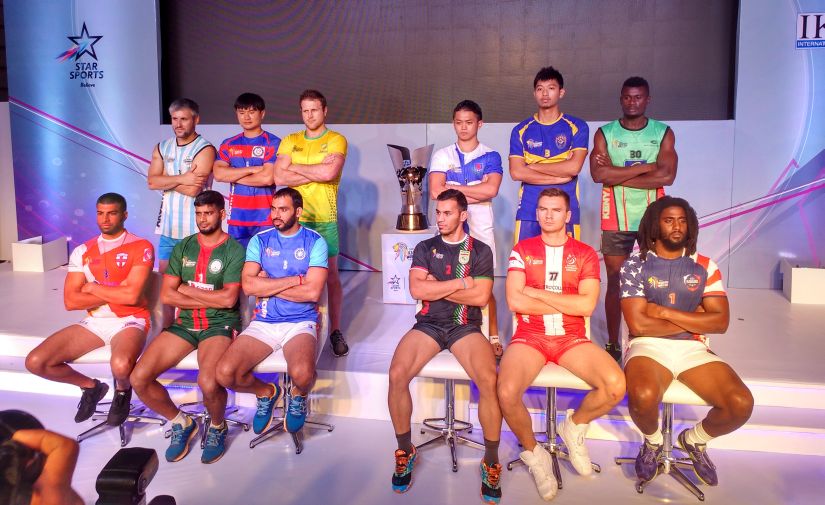When an elated looking Charu Sharma announced a ‘Kabaddi World Cup’ this year, it sounded exciting despite the two seasons of Pro Kabaddi League (PKL). There was however, a question mark over the word ‘world’ – which actually got bigger when the teams were announced – Argentina, Australia, USA, Poland. Over the past two weeks, the International Kabaddi Federation (IKF) and Star Sports, broadcaster of the World Cup and major stakeholder of the PKL, have checked many boxes at the event in Ahmedabad. Participation of five Olympian continents – check Coverage in 120 countries – check Good PR to warrant a positive vibe – check But as loudly as their hyperactive presenters may say it, ‘kabaddi going global’ is still a question in reality. The answer, to quote Will McAvoy from The Newsroom, is ‘No. But it can be.’ [caption id=“attachment_3068482” align=“alignnone” width=“825”]  The captains of the 12 participating nations in the Kabaddi World Cup.[/caption] The big Indian shaadi In the month prior to the event, while The Arena by TransStadia was drying its cement, many participating teams were either scouting for decent players or teaching basic rules to them. Australian coach Navneet Gautam told us about spending time in Melbourne scouting for Footy League players who were beyond their sell-by date. In Tokyo, Indian coach Ashok Shinde was honing a newly formed team comprising University students, a priest and a pro wrestler. In England, a pharmacist, dentist and med school students were preparing to put up a good show. The wild cards however, were the North Americans, who were hustling to assemble a team in Florida, one that could fly to India in under a month. An Indian coach called Rana took to training a ragtag bunch that included a musician, a rapper, a body-builder and an aspiring media entrepreneur, in Jacksonville. Eventually, the Americans who flew in hours before their first game played a nightmarish tournament, losing all games with an eventual score difference of 211. In related news, the US team was shielded by the organisers from most media interactions. The IKF and Star would take credence in putting up this ‘dhoom-dhaam shaadi’ in just over two months after PKL 3, but we hope teams are pre-decided in the next edition (and there is a qualifying process in the future) so they undergo rigorous training camps and play kabaddi that doesn’t put the baraatis to sleep. Export ‘Made in India’ coaches Which brings us to what the IKF must do if it is serious in developing the game, especially outside the sub-continent. As India has been the centre-point of all kabaddi expertise and there are SAI (Sports Authority of India) appointed coaches aplenty, we must connect with kabaddi federations to lend coaching expertise and professional training modules. As kabaddi does not require much investment, ground-up development of the sport could happen at training camps where our gurus hand-hold local athletes and hone their skills. Teams such as Japan, Poland and even Iran benefited from Indian expertise in the few weeks of the World Cup, and the Koreans delivering a solid show was a direct result of a few Indians taking kabaddi to their country in the last decade and a few Koreans coming over to Gandhinagar to train in 2014. IKF, don’t go the ICC way With the Indian team’s stellar record in Asian competitions, we cannot be too critical of the IKF, but looking at its structure, it sure could do with more qualified men from sporting backgrounds. Its current head, Janardan Singh Gehlot, has been so since its inception in 2004 and its CEO, the hat-donning Deoraj Chaturvedi has a past resume of sales, pharma and of being an HR manager of a cable TV company until April 2012. After having tasted blood with the Pro Kabaddi League which transformed the sport, the IKF could do with a makeover itself, starting from bothering to make a website. It could work diplomatically with other countries to ensure the introduction and growth of kabaddi. For instance, if it cajoles the powers-to-be in Thailand to introduce kabaddi in its military training, the Thais would have a wider pool of players to choose from, rather than the school boys that they did, and still reached the semis. Or, IKF could choose to go in the direction of another sporting body we all know of, the one which is ‘international’ but is headed and bullied by Indians who run a cash-rich private league. If buzz is to be believed, the Kabaddi World Cup will occur once every two years. While the PKL will do its job of entertaining new audiences and popularising the sport, we will only know if kabaddi has indeed gone global when we see more ‘favourites’ than ‘minnows’ in the next World Cup.
Kabaddi World Cup 2016, the so-called ‘global’ event was a glitzy rebirth for the sport but much needs to be done to not see rag-tag teams and one-sided snooze fests in the future.
Advertisement
End of Article
Written by Malay Desai
Malay Desai is a feature writer with a penchant for travel, food and test cricket. But as none of those pay his credit card bills, he runs the content firm Punchlines.' see more


)

)
)
)
)
)
)
)
)



